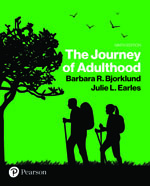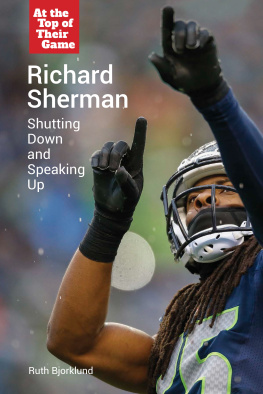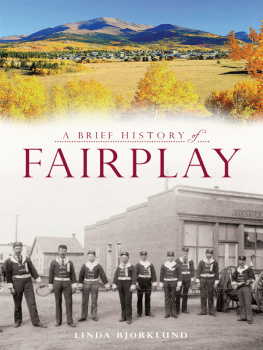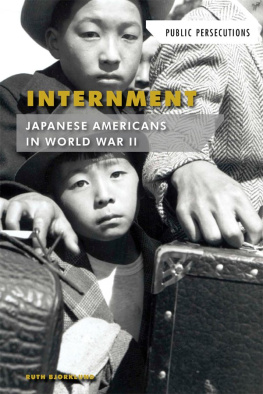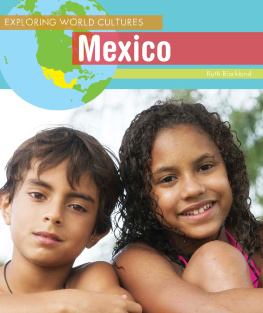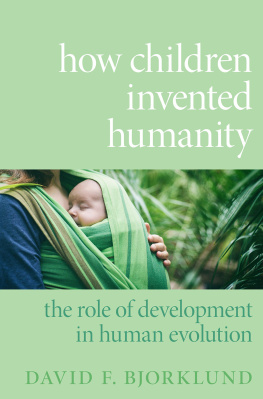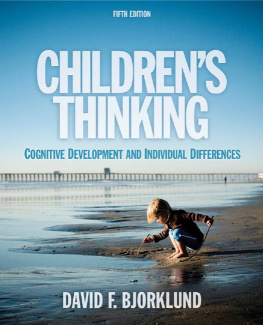Barbara R. Bjorklund - Journey of Adulthood
Here you can read online Barbara R. Bjorklund - Journey of Adulthood full text of the book (entire story) in english for free. Download pdf and epub, get meaning, cover and reviews about this ebook. year: 2019, publisher: Pearson, genre: Science. Description of the work, (preface) as well as reviews are available. Best literature library LitArk.com created for fans of good reading and offers a wide selection of genres:
Romance novel
Science fiction
Adventure
Detective
Science
History
Home and family
Prose
Art
Politics
Computer
Non-fiction
Religion
Business
Children
Humor
Choose a favorite category and find really read worthwhile books. Enjoy immersion in the world of imagination, feel the emotions of the characters or learn something new for yourself, make an fascinating discovery.
- Book:Journey of Adulthood
- Author:
- Publisher:Pearson
- Genre:
- Year:2019
- Rating:3 / 5
- Favourites:Add to favourites
- Your mark:
- 60
- 1
- 2
- 3
- 4
- 5
Journey of Adulthood: summary, description and annotation
We offer to read an annotation, description, summary or preface (depends on what the author of the book "Journey of Adulthood" wrote himself). If you haven't found the necessary information about the book — write in the comments, we will try to find it.
Journey of Adulthood — read online for free the complete book (whole text) full work
Below is the text of the book, divided by pages. System saving the place of the last page read, allows you to conveniently read the book "Journey of Adulthood" online for free, without having to search again every time where you left off. Put a bookmark, and you can go to the page where you finished reading at any time.
Font size:
Interval:
Bookmark:
Listen to the Audio
Now in its ninth edition, The Journey of Adulthood continues to capture the dynamic process of adult development from early adulthood to the end of life. Its core is made up of research findings from large-scale projects and major theories of adult development, but it also reflects smaller studies of diverse groups, showing the influences of gender, culture, ethnicity, race, and socioeconomic background on this journey. I have balanced new research with classic studies from pioneers in the field of adult development. And I have sweetened this sometimes medicinal taste with a spoonful of honeya little personal warmth and humor. After all, I am now officially an older adult who is on this journey along with my husband, looking ahead at the examples our parents journeys gave us, and back toward our children who are blazing their own trails. And as of this edition, we have 14 grandchildrenseven of whom are beginning their own journeys of adulthood either as college students or starting their careers.
Not only have I changed over the course of this book, but I have taken on a co-author and have truly enjoyed having her input. She is Dr. Julie Earles, a long-time friend and colleague at the Wilkes Honors College of Florida Atlantic University. She has a little different spin on things, and I think it will make this an even better book as she adds more and more to the chapters.
The ninth edition of The Journey of Adulthood features a comprehensive update of all chapters. Almost one-third of the references are new to this edition, as are many of the figures and tables. The field of adult development is changing quickly, and this edition of The Journey of Adulthood gives a thorough coverage of the changes that have taken place since the previous edition was written 4 years ago. Ultimately a text on development, The Journey of Adulthood has itself developed through numerous editions over the past two decades. This ninth edition features several types of change; some reflect change in the field of adult development and some reflect change in the world around us, specifically, the academic settings in which this text is used.
The study of adult development is a fairly new field and it expands exponentially from year to year. It began as a field of psychology, but more and more disciplines have shown an interest in the changes that take place over the adult years. This book includes research from scientists who identify themselves as psychologists, sociologists, anthropologists, neuroscientists, epidemiologists, behavioral geneticists, cellular biologists, biogerontologists, and many more. The terminology and methods in these fields have become more and more similar, and many researchers publish in the journals of a variety of fields. This edition of The Journey of Adulthood reflects this wonderful collaboration and the richness of a number of multidisciplinary projects. It is an exciting time in developmental science, and this text reflects that energy.
Some of the projects that have been tapped for this text are the Midlife in the U.S. Study (MIDUS), the Berlin Study of Aging, the Grant Study of Harvard Men, the National Comorbidity Study, the Nun Study of the School Sisters of Notre Dame, the Victoria Longitudinal Study, the Swedish Twin Study, the National Survey of Sexual and Health Behavior, The Womens Health Study, and the National Longitudinal Mortality Study.
To emphasize these collaborations, we have identified each major researcher or theorist with his or her field of study. Two editions ago, I was struck with the diversity of scientific fields contributing to the adult development literature. We want this text to reflect that diversity. When we discuss some work in detail, we give the full names of the researchers and how they identify their field of study. We hope that the students who are interested in adult development will take note and consider these areas when they declare their majors or make plans for graduate school. As professors, we all need to remember that we not only teach the content of the courses, but also guide our students in career decisionsin life decisions.
Another change in the field of adult development is that more and more research projects reported in major journals are done by international groups of researchers in settings all over the developed world. We are no longer limited to information on adults in the United States, we also have research being done by Swedish, Japanese, and Egyptian scientists using Swedish, Japanese, and Egyptian participants. When the findings are similar to studies done in the United States, we can be more confident that the developmental phenomenon being studied is an integral part of the human experience and not something particular to people in the United States. When the findings are different from studies done in the United States, we can investigate these differences and find their roots. We have identified these international research teams and the nationalities of their participants. We hope this accentuates the global aspects of our academic community and, as seasoned travelers ourselves, we hope it inspires students to consider study-abroad programs and to consider the world outside their own.
We include full names of major researchers and theorists when we discuss their work in detail. Seeing the first and last names makes the researchers more real to the students than conventional citations of last names, comma, date. Full names also reflect the diversity of scientistsoften their gender and their national or ethnic backgrounds. Our students represent a wide range of races and ethnicities, and the time of science being the sole domain of an elite group most of us cannot identify with is gone.
One of the most exciting changes in the field of adult development has been its expansion to emphasize a wider and wider range of age groups. In the early editions of this text, the focus of interest was older adults. The last three editions have featured more and more studies of young adults, middle-aged adults, and emerging adults. This edition features additional research on the opposite end of the age spectrum: those who are 75, 80, 90 years of age and older. Although having people in this age group is nothing new, the growing numbers of them have made it important (and relatively easy) to include them in studies of adult development. Clearly the study of adult development is no longer the study of certain specific age groups, it is now truly a study of every aspect of adulthood. We have tried to capture this inclusion by choosing topics, examples, opening stories, photos, suggested reading, and critical thinking questions that represent the entire adult lifespan.
Since the last edition of this book, the world has changed in many ways. As we write this preface, we seem to have recovered from the financial setbacks many families experienced a decade ago and unemployment numbers are low. However, technology and outsourcing have replaced workers in many areas, and those replaced workers are often underemployed in fields that have lower wages. Many students are graduating from college with student loan debt and poor job prospects in their areas of study. Opioid abuse has become a public health crisis, taking a toll on every part of the country and every level of society. Cutbacks in government funding and the weakening of regulations threaten our environment and our planets future. There is a large political divide. More troops are coming home from overseas deployment, but many have war-related disabilities that include posttraumatic stress disorder (PTSD) and traumatic brain injury (TBI). Single-parent families and dual-earner families in the United States (and in many other developed countries) are having a rough time; they receive little cooperation from the government, the workplace, or the community to assist them in caring for both job and family. Many older women, especially those who live alone, are living below the poverty line. The United States has the highest rates of mental health disorders of any developed country and most of the people experiencing these symptoms do not get adequate treatment. Unhealthy lifestyles are resulting in increased health problems for many adults in the developing world, and the ages of those affected are extending to both the younger and older end of the spectrum. Although we try to maintain a positive tone, these topics are part of the reality of adult life, and we have included them in
Font size:
Interval:
Bookmark:
Similar books «Journey of Adulthood»
Look at similar books to Journey of Adulthood. We have selected literature similar in name and meaning in the hope of providing readers with more options to find new, interesting, not yet read works.
Discussion, reviews of the book Journey of Adulthood and just readers' own opinions. Leave your comments, write what you think about the work, its meaning or the main characters. Specify what exactly you liked and what you didn't like, and why you think so.

